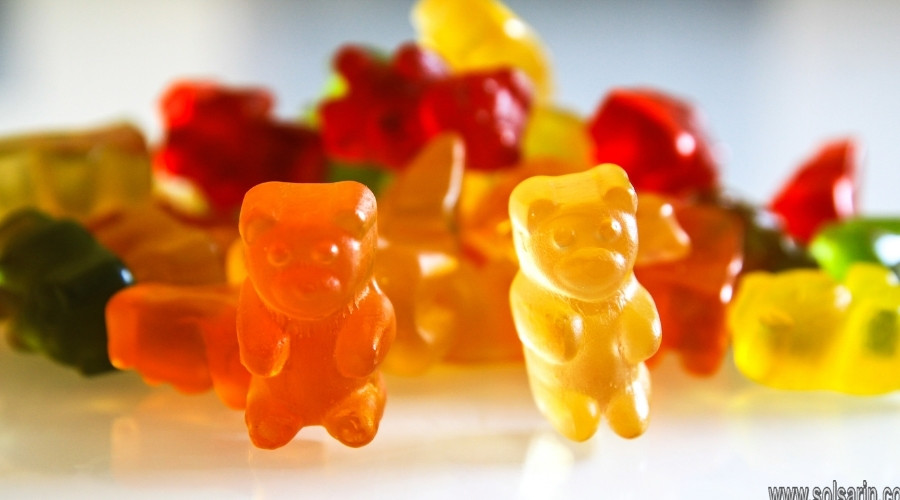are gummy bears bad for dogs
Hi,welcome to solsarin site, today we want to talk about“are gummy bears bad for dogs”,
thank you for choosing us.
are gummy bears bad for dogs?
sweet gummy bear come in many shapes and sizes. Your dog can find gummy bears anywhere; on the sidewalk, under tables at a cafe, or even on your kitchen floor. Read on to learn more about what gummy bears are dangerous for dogs and how even non-toxic treats can adversely affect your dog’s health.
Some gummy bear ingredients are more dangerous than others.
Here are a few ingredients you should always avoid:
Xylitol Toxicity
This is where the biggest danger lies. It’s also why it is best never to feed gummy candies to dogs. If there is any possibility they contain the artificial sweetener xylitol, it’s not worth the risk. Xylitol has become popular in several human products to decrease the calorie content and for its plaque-reducing effects.
This common artificial sweetener can be found in sugar-free gummy bears, jelly beans, breath mints, chewable vitamin gummies, protein bars, peanut butter, mouth wash, toothpaste, and even in some medications.
Xylitol has two major toxic effects on dogs. It causes severe hypoglycemia (critically low blood sugar or blood glucose levels) and also direct damage to the liver, both of which can be deadly. If you suspect your canine companion has eaten xylitol, call your veterinarian immediately.
Other artificial sweeteners such as maltitol, sorbitol, and steviol glycosides (Stevia) are also found in gummy bears and gummy candies. Fortunately, these are non-toxic to dogs; however, you might remember the popular product reviews for the sugar-free Haribo gummy bears – when eaten in larger quantities, these artificially-sweetened bears can cause significant gastrointestinal upsets and diarrhea.


Symptoms of Xylitol Poisoning
Xylitol poisoning symptoms develop rapidly, usually within 15-20 minutes of consumption. Here are a few signs of xylitol poising:
- Vomiting
- Weakness
- Depression or lethargy
- Lack of coordination or difficulty standing or walking
- Tremors
- Seizures
- Coma
In severe cases, the dog can develop seizures or liver failure. Dogs that develop liver failure often show signs of hypoglycemia.
Sugar
If your gummy bears do not contain Xylitol, then it’s unlikely that eating a few here and there will be life-threatening. However, there is little more than gelatin and sugar in the ingredients, so this is a treat that can still lead to obesity and raised sugar levels. Too much sugar over an extended period can also lead to other conditions like diabetes that can dramatically shorten your pet’s life.
Choking Hazard
Another problem you will need to worry about if you feed your dog a regular diet of gummy bears is that they may present a choking hazard. Their small size can easily get lodged in the teeth and throat of your pet.
Cavities
Just like people, dogs can get cavities. It’s also difficult to get them to brush twice a day, so the sugar is likely to remain on their teeth. One gummy bear won’t cause cavities. However, if your dog frequently eats sugary treats, cavities can become a problem.
Obesity
Obesity is another health concern. A high sugar diet contributes to obesity in dogs. Obesity is linked to many negative health effects, including an increased risk of cancer, diabetes, and arthritis.


Can dogs have Gummy Bears?
No, dogs should not have Gummy Bears. It’s not a good idea to feed our canine friends Gummy Bears since Gummy Bears are considered sweets or candy.
These chewy candies are packed full of sugar and contain fats. Both sugar and fats are harmful to our furry friend’s health.
Let’s dig deeper and take a look at the ingredients of some of the most popular Gummy Bears in the US.
Can Dogs Die From Gummy Bears?
If the gummy bears are made with xylitol then yes, they can die from it. Even just a few grams of xylitol sugar substitute can be fatal for a 65-pound dog.
The good news is that one or two gummy bears might not kill them. Even so, you should still watch your dog closely and call your veterinarian if you think your dog ate gummy bears with xylitol in it. Always keep your dog away from sugar-free gummy bears.
Can Dogs Eat Gummy Bears Without Xylitol?
Even though gummy bears without xylitol are safer than the ones with them, dogs should not eat gummy bears at all.
Even full-sugar gummy bears are bad for dogs. The sugar levels could give your dog an upset stomach.
The high sugar content of gummy bears can cause negative health effects in the long-term – especially if they have a diet that is high in sugar from other sources. A poor diet might not kill your dog immediately, but it could cause their health to decline slowly over time.
Either way, gummy bears are known as dangerous foods that could cause weight gain (even in small amounts) or affect their low blood sugar.
It’s a better idea to give your dog a healthy snack made with peanut butter than a few bites of sugary treats.


What Happens If A Dog Eats Sugar or Gummy Bears?
The sweet candies and gummies are poisoned food for the dogs as they consider in the top 10 dangerous foods for a dog in the world. Gummy bears or worms contain lots of calories which can make your dog hyper and fatty.
Because of this high gluten and calories substitute, your pooch can bear certain complications like obesity. It will make your dog weak & lethargic also possible that the furry companion become shaking and energyless.
What should I do if my dog eats gummy bears?
You’ll have to take care of a few things before heading out to the vet. You can give your dog water to drink and flush out the toxins. This will reduce the risk of dehydration and help your dog relax.
If your dog ate a xylitol-free gummy bear, there’s no reason to be worried. Just make sure that you keep all gummy bears away to avoid problems in the future.
If you suspect that your dog has eaten a bowl of gummy bears containing xylitol, please consult your veterinarian or Pet Poison Helpline immediately.
Do not induce vomiting or give your dog any medication unless directed to do so by your veterinarian. It is important to get the right treatment for your pet as quickly as possible.
As some dogs may be hypoglycemic, inducing vomiting can make their condition worse.
Can dogs eat CBD gummy bears?
CBD itself is not toxic for dogs, but other ingredients in gummies may be. Depending on the ingredients found in your gummies, your dog might experience mild effects like nausea and diarrhea, or they might require further care to help eliminate toxins from their system.
Can dogs eat melatonin gummies?
Yes, melatonin is safe for dogs when administered properly. For dosing, the recommendation is 1 mg of melatonin per 20 pounds your dog weighs. It takes about 30 minutes for the effects of melatonin to kick in. Melatonin can cause side effects in dogs, such as drowsiness, upset stomach, and increased heart rate.


Can dogs eat gummy candy?
No, dogs should not eat gummy candy. They will not be harmed if they get a hold of some accidentally, unless the candy contains the sugar substitute Xylitol. But gummy candy is not a good go-to treat.
- Apples
- Baby carrots
- Blueberries
- Raspberries
- Mangoes
- Cantaloupe
Can Dogs Eat Gummy Worms?
As gummy worms, gummy bears, used for human consumption. And some of those contain various artificial ingredients, such as Xylitol, and they are not healthy for dogs.
Every brand uses different formulas for different products depending on the manufacturer. Natural or artificial flavor and color available in which gelatin is always the primary ingredient. According to research, 325 calories, 77.5 g of carbs, 7.5.g of protein, found inside 100g of gummy worms. Some brands also add vitamins to the formula. In short, although the ingredients are fine. The nutritional value is still lacking somewhere in this food.
Can Dogs Eat Gummy Fruit Snack?
All gummy foods are not any neutral benefit for dogs, and some are toxic to dogs just based on the ingredients. Can dogs eat gummy fruit snacks? The answer to this question also depends on the ingredients. If companies claim they are sugar-free. Then it should contain artificial sweeteners, which should be Xylitol. Xylitol is poisonous to dogs.
Mostly gummy bears have flavoring, glucose syrup, coloring, sugar, gelatin, starch, and citric acid. At the same time, these ingredients are not bad for dogs. Neither isn’t good for dogs. If your dog occasionally eats gummy worms, it wouldn’t do any harm, but it doesn’t mean we are suggesting you make it a regular part of your dog’s diet.
How much xylitol is toxic to dogs?
How much xylitol is poisonous to a dog? The dose of xylitol that can cause hypoglycemia in the dog has been reported between 50 milligrams (mg) of xylitol per pound of body weight (100 mg per kg). The higher the dose ingested, the more the risk of liver failure.
Haribo gummy bears ingredients
Among the Ingredients of Gold bears gummy candy by Haribo are corn syrup, sugar, gelatin, dextrose, citric acid, corn starch, artificial and natural flavors, fractionated coconut oil, carnauba wax, beeswax coating, artificial colors: yellow 5, red 40, blue 1.
As you can see, the lion’s share of components is not your typical healthy and natural one. Even if the human body can cope with it, it doesn’t mean that it’s as easy for dogs.
Haribo gummy bears nutritional value
According to the USDA (United States Department of Agriculture) Food Database, the 100g serving of gold gummy bears by Haribo contains 333 calories, 7.69 g of protein, 76.92 g of carbs, (48.72 g of it comes from sugar) and 0g of fat. No minerals or nutrients were spotted according to the analysis. In a nutshell, lots of empty calories and high in sugar. Not the best combination for canines.



